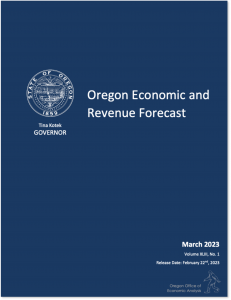Oregon Economic and Revenue Forecast – March 2023

EXECUTIVE SUMMARY
March 2023
Either the economic storm clouds have parted, or we are in the eye of the hurricane. Any near-term recession fears are fading with each month of somewhat lower inflation and the continued economic boom.
However, the Federal Reserve must still navigate the choppy waters of a tight labor market, fast wage growth, easing financial conditions, and strong household finances and consumer spending. All of these are likely to keep the underlying trend in inflation above the Fed’s target for the foreseeable future. Last quarter our office made a late 2023 mild recession the most likely outcome for the Oregon economy, primarily due to the fact there had been zero slowdown in inflation at that time.
Today, there have been a few months of somewhat lower inflation. Even as the underlying trend in inflation remains twice as fast as the Federal Reserve’s target, this is a noticeable slowing from much of last year. The Fed is also starting to ease off the brakes and wait for the impact of past interest rate increases to cool the economy in the months ahead.
What this means for the forecast is that the potential recession dynamics, while still very real, are likely pushed further out. The current baseline forecast no longer calls for a recession this year, but for the economic soft landing and continued expansion.
While every month of slower inflation increases the probability of a true soft landing, it is likely that the Fed has more work to do. Additional interest rates increases, and holding them higher for longer are likely need to cool demand and inflation. However, the clear near-term strength in the economy in terms of jobs, income and spending, along with the uncertainty of the exact timing of any potential recession makes forecasting one so far in advance challenging, if not impossible.
As Oregon heads into the upcoming 2023-25 biennium, the inflationary economic boom continues. Personal and corporate tax collections continue to outstrip expectations. When combined with an improved economic outlook, policymakers are expected to have additional General Fund revenues during the current legislative session as they craft the 2023-25 budget. Although the recent news has been good, there remains a significant amount of uncertainty as the biennium winds down.
The 2023 tax filing season has yet to truly begin. Much more will be known when the May 2023 forecast is produced, which will determine the Close of Session forecast and be used to set the thresholds for the balanced budget and any potential kicker calculations.
Along with uncertainty surrounding the tax season, there is also the heightened risk of recession next biennium. Given the currently elevated levels of taxable business and investment forms of income, an economic downturn would result in large losses of General Fund revenues. While Oregon’s General Fund is volatile over the business cycle, the state’s overall revenue system has become less so in recent years.
The increases in consumption based taxes should help reduce overall volatility in Oregon’s tax system as consumer spending is more stable during downturns than is taxable income.
The unexpected revenue growth in the current biennium has left Oregon with unprecedented balances, followed by a record kicker in 2023-25. The projected personal kicker is $3.9 billion, which will be credited to taxpayers when they file their returns in 2024.
The projected corporate kicker is $1.5 billion, which will be retained in the General Fund for K-12 educational spending. Once the 2023-25 biennium is behind us, Oregon’s major revenue sources are expected to bounce back quickly.
However, growth over the extended horizon will continue to be constrained by demographics, with the baby-boom population cohort earning and spending less.
Read the full forecast at https://www.oregon.gov/das/OEA/Documents/forecast0323.pdf
by Press Release
State of Oregon Employment Department


Advertisement